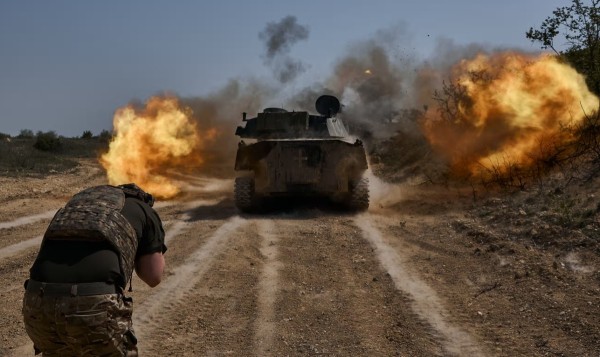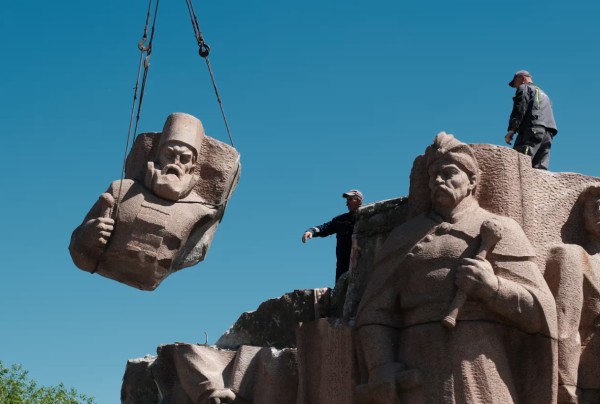A new 5th column - or normal discharge of duty?
It is straightforward. If you have Russian citizenship, then fulfill your duty to your fatherland. Serve your time in the Russian Army.
It is not a massive trend. Accurate statistics are not available. But according to sources in the Russian military, several dozen have served their term or completed Russian military schools. The lingering conflict with Chechnya has been given as the reason why the numbers are not larger.
A Russian military recruiter, situated in a town close to the Estonian border, has stated that Estonian residents indeed come to him, register and then serve time or attend military school.
A two-year service is mandatory for 18 to 27-year-old males. He is then subject to military duties up to the age of 50.
The Russian recruiter explains that the motivation for Estonian residents is the perceived nationalism connected to the Estonian military, and the fact that they are forced to write in Estonian. (A seemingly illogical explanation – ed.) The absence of Estonian citizenship is not a factor, the recruiter says.
Russians in Estonia have warned young men that serving in the Russian army may mean the cancellation of his Estonian residency permit. However, Estonia’s interior ministry states that Estonian residents serving in the Russian army are not liable to lose their Estonian residency. If the recruit is abroad more than six months he must inform Estonia’s Citizenship and Migration agency. He can even visit Estonia during his military service period.
A recruit’s oath of allegiance says: “I pledge to fulfill my military duty with dignity, courageously protect Russian freedom, independence and constitutional order, people and fatherland.”
With no accurate estimate of the size of the returned Russian militarily trained contingent of young men, it is difficult to gauge the potential threat to Estonia’s security. The recruit is likely subjected to a significant dose of Russian nationalism including the identification of an “enemy country list”. With Vladimir Putin’s promotion of ex-KGB and FSB professionals throughout the top management of the country’s administration it is more than possible that Russian clandestine services would not let such opportunities pass. They’ve got captive and receptive minds recruited to a two-year intensive course on how better to serve the fatherland when summoned.
One can justifiably ask: were there militarily-trained Russians acting as agitators/provocateurs during the riots of last April? Who benefited from the slaying of a Russian youth participating in the looting of stores and businesses?
We must also remember what Putin has repeatedly stressed: Russians living abroad must influence the political direction of the countries of their residence as well as alliances such as NATO and the European Union.
Being alarmist unnecessarily harms Estonian interests in reducing international tensions and striving for productive relations with everybody. On the other hand, treating a potentially harmful situation too casually may result in serious regrets later.
It is a dilemma Estonia faces daily. So far the nation’s leadership has had the luck and/or perspicacity to see things through.
Estonian residents in the Russian Army (4)
Archived Articles | 15 Dec 2007 | Estonian Central Council in CanadaEWR
Viimased kommentaarid
Kommentaarid on kirjutatud EWR lugejate poolt. Nende sisu ei pruugi ühtida EWR toimetuse seisukohtadega.
Vene sõjaväest saab siit lugeda:
http://www.epl.ee/uudised/4118...
http://www.epl.ee/uudised/4118...
I'm trying to think of reasons why a Russian residing in Estonia would voluntarily serve in the Russian army. I can only come up with one -- to keep the door open for emigration to Russia should life in Estonia ever become unpleasant.
To date, very few Russians have left Estonia for Russia, in spite of formal appeals and financial incentives. It appears that Estonia's Russians know what life is like in Russia. The life of a conscript in the Russian army is even worse; it's structured by intimidation and brutality (much like a Canadian prison) with a correspondingly high rate of homicides and suicides.
Only a person like Maxim could see something rosey it.
To date, very few Russians have left Estonia for Russia, in spite of formal appeals and financial incentives. It appears that Estonia's Russians know what life is like in Russia. The life of a conscript in the Russian army is even worse; it's structured by intimidation and brutality (much like a Canadian prison) with a correspondingly high rate of homicides and suicides.
Only a person like Maxim could see something rosey it.
In all honesty, I can't make heads or tails out of the preceding comment. Can anybody help translate?
Archived Articles
TRENDING




















